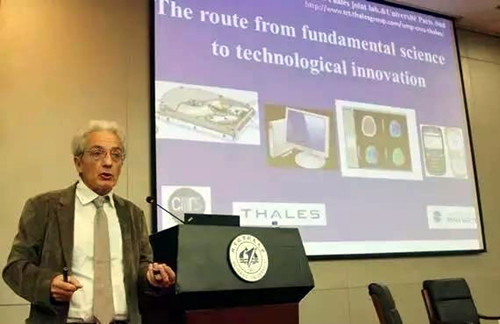Nobel Prize winner gets green card at Zhongguancun
April 07 , 2017
Albert Fert has become the first Nobel Prize winner to obtain permanent residence in China through a pilot project of Beijing’s Zhongguancun Science Park.
China began issuing permanent residence permits in 2004, however, the green card is among the most difficult in the world to obtain due to stringent requirements. Between 2004 and 2015, Beijing issued only 1,700 permanent residence permits.
To attract more foreign talent and facilitate Zhongguancun’s development, Beijing started a pilot project in March 2016 that enables foreign startups or skilled professionals in the science park to apply for permanent residence.
Foreign workers at startups, or who have been hired by companies in Zhongguancun Science Park, can receive a recommendation letter for a green card if they met the standards of a merit-based point system.
The pilot program’s first group of 45 foreigners each gained more than 70 of 100 possible points under the merit system and received recommendation letters in January. Points are based on factors such as education, experience and the demand for certain technological know-how.
Zhang Wenqiong, deputy director of the Zhongguancun Talent Center, says the policy focuses mainly on the development potential of startups, along with other factors.
Zheng Jinlian, deputy secretary-general of the Center for China and Globalization(CCG), says foreigners now have two windows of opportunity a year to apply for permanent residence.
“The whole process, from collecting application materials to completing the assessment, takes four months,” she says. “We have a group of more than 100 experts review the application materials.”
Albert Fert shared the Nobel Prize in Physics in 2007 with his German counterpart Peter Grünberg for researching giant magnetoresistance. Joining hands with the Beijing University of Aeronautics and Astronautics, he established the Fert Beijing Research Institute in 2014.
Getting the so-called green card will be bound to provide more convenience for Albert to cooperate with Chinese scientists.
In addition to obtaining permanent residence by accumulating points, there are four ways an expatriate in Beijing can apply for a Chinese “green card”.
1. Overseas Chinese employed by enterprises in the high-tech hub of Zhongguancun who have doctorate degrees or have worked four consecutive years and lived more than six months every year in China can apply.
2. Foreign residents who have worked in Beijing for four consecutive years, received an annual salary during that time of at least 500,000 yuan ($72,560) before tax, have lived more than six months every year in China, and have a stable income and residence can apply.
3. Foreigners who have paid more than 100,000 yuan in personal income tax every year with recommendation from a local employer can apply.
4. “High-end foreign experts” with recognition from the Beijing city human resources authority and high-end professional workers hired on a five-year working permit by a local company with recognition from the capital’s technology and innovation authority can apply for permanent residency after three years working in China, upon recommendation from a local employer.






